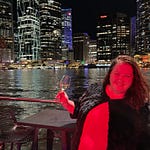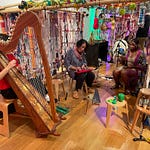
In this episode of Streets of Your Town podcast—The Journo Project, we feature Peter Greste, a journalist with decades of experience as an international correspondent in countries from Afghanistan to the former Yugoslavia, Africa, and South America.
But it was when he was imprisoned in an Egyptian jail for 400 days that his reporting became truly world renowned.
He says he is still shocked that reporting on what he describes as a run of the mill story, could end in such incredible circumstances.
“When we were told what the charges were, being members of a terrorist organisation, aiding and abetting a terrorist organisation, financing a terrorist organisation, broadcasting false news with intent to undermine national security, these charges were crazy,” Peter says.
“These were serious hardcore terrorism offences, as serious as you could possibly get short of actually pulling the trigger on on an AK47 in a crowded room, and it just made no sense to me. It really didn't.
“I think at each stage of the process we thought that it wouldn't continue, because the gap between what we'd been accused of doing, those very serious terrorism charges, and the reality of what we had actually been doing, which was, to my mind, some pretty mundane journalism, that gap is so wide that I couldn't see how anybody could have conceivably made that connection.
“People have said, ‘Well, maybe it's because you guys were working for Al Jazeera. Al Jazeera have been accused of siding with the Muslim Brotherhood, and therefore, you're part of that, put up in that kind of wider conspiracy’. I felt that if that was the case, why would the Egyptians come after an Australian and two Egyptian producers?
“It made no sense. If you wanted to make a conspiracy about Qatar malfeasance in Egypt, then there were other better ways of doing it.”
He says he has since realised the bigger picture of what was happening.
“The more I thought about it, the more I realised this wasn't about anything we had done, it's about what we'd represented, and that was press freedom,” he says.
“The government was simply trying to intimidate all journalists that were operating and sending a very clear message, you will not speak to the Muslim Brotherhood.
“Cairo used to be the hub for regional coverage, it no longer is. Very few news bureaus have a permanent presence there.
“The authorities have locked up, threatened, and intimidated pretty much anybody who is doing what would considered to be authoritative, credible journalism. It's almost impossible to operate. Local journalism has also been brutally handled. Anybody that questions or challenges the authorities is either in prison or in exile.”
Professor Peter Greste is now the UNESCO Chair in Journalism and Communications at the University of Queensland, and also a founding member and director of The Alliance for Journalists’ Freedom.
He is a champion for media freedom in Australia, calling for an urgent review of the many national security laws passed by Federal Parliament in recent years.
He says these changes have eroded media freedom, to the point where they limit and even criminalise the legitimate work of journalists, with deeply damaging ramifications to the very foundations of our democracy.
“Clearly Australia is not Egypt, and not about to become Egypt anytime soon, but, and there is a but here, if you think about what happened to us in the abstract, where the government used national security legislation and framed it so loosely that it could be interpreted in a way that criminalised what would normally have been considered as legitimate journalism, then we're seeing actually the same kinds of trends taking place here in Australia,” he says.
“Ever since 9/11, Australia has passed more than 70 pieces of national security legislation, more than any other country on earth, and a lot of those are so loosely drawn that they criminalise legitimate journalism. This is not an abstract idea.
“When we saw the raids by the Australian Federal Police on News Corp and ABC journalists a few weeks ago, I realised that this was always going to be coming.
“So understanding that has actually made me feel quite concerned.”
Peter Greste’s work as an international correspondent is extensive.
“I felt enormous sense of responsibility, but also an enormous sense of empowerment, because let's face it, the one thing that journalists want is for their stories to make a difference. It's important that we tell the stories,” he says.
"We also want our stories to move the dial in some way. In Afghanistan, you could see, when you did a story, you would get a reaction. Sometimes it was positive, sometimes it was negative, but there was almost never, no reaction.
“I went to Yugoslavia with Reuters, to Belgrade. This was just after the war…a lot of very serious internal struggles for political power, and also the fallout of the end of the Bosnian War.
“I also realised that actually I had a passion for international news, and so I went to Latin America and had five years in Mexico, Chile, and Argentina covering pretty much everything from Mexico on south.
“I remember speaking to the Zapatista rebels in Mexico, in Southern Mexico in Chiapas and going off to do stories about the rebels in Colombia, the FARC rebels in Columbia. We saw the elections that brought Hugo Chavez to power in Venezuela. All of these incredible moments that I still feel very privileged to be a part of.”
Recognition for his international reporting culminated with the prestigious Peabody Award for his documentary on Somalia.
But that story came at significant personal cost.
“Five years earlier, I'd been in Somalia, my first trip in with my producer Kate Peyton, and we were doing a whole series of stories about the country as it was emerging at that point, and someone took a shot, put a bullet in Kate's back and she died as a result of that,” he says, pausing at the memory.
“I had to pull out of Somalia very, very quickly as you can imagine.
“It was pretty horrific. It was the worst time of my life, I'd say, worse than even imprisonment in Egypt.
“Losing a friend and colleague like that is extremely tough. But I also felt quite bloody-minded about it. I felt that the arseholes who'd done that were trying to send a message to us to frighten us away from Somalia.
“Both of us had gone in fully understanding the risks we were involved with, but also feeling that I would be dishonouring Kate's memory to run away and never return.
“So I conceived this idea, this portrait of Mogadishu basically to finish the work that Kate and I never managed to get done, never managed to achieve on that first trip.
“I didn't want it to be about me and Kate, because obviously what was taking place in Somalia at the time was incredibly tough for hundreds of thousands of people, and in fact, what I'd been been through was pretty typical of what everyone in Somalia had experienced. You couldn't find anybody in the country that hadn't lost a close friend or relative at some point.
“So while that experience needed to inform the project, I wanted to make sure that it wasn't about us, it was about Somalis themselves.”
He says he still sees himself as a storyteller, and never takes for granted that responsibility.
“For a lot of people, a lot of journalists obviously, writing is their passion. For me, writing was the excuse,” he says.
“For me, the journalism was the kind of excuse that I needed to go off and have all of these adventures, to indulge my curiosity. The writing part of it wasn't really the thing that inspired me, what did inspire me was that licence to indulge a curiosity.”
Behind the scenes

This week I had the opportunity to talk to everyone listening in to ABC Brisbane 612 about what The Journo Project is trying to achieve. Funnily enough it was a live cross from the Cairns ABC studio! When presenter Matt Wordsworth invited me to come on and talk about my new podcast series, I wasn’t going to say no! So on our first day of holidays in beautiful far North Queensland, we got off the plane and headed straight for the ABC studio to get the “cans” on (as they call headphones in the biz) and talk to Matt down the line. You can listen to the interview on Soundcloud.
The Journo Project launch party


Thanks to all of you wonderful subscribers for your amazing support of my new podcast series, Streets of Your Town—The Journo Project! It’s wonderful to know there’s as many people out there who hate click bait as much as I do and are willing to support and celebrate great Aussie journos. I had a little launch party in Brisbane on Friday when the first episode featuring amazing investigative journo Hedley Thomas landed in all of your inboxes. It was such an exciting moment and wonderful to share with my subscribers and friends such as Karni Liddell, who will be featured in a future episode! Stay tuned! And please, share this email link with a few friends who will also consider supporting press freedom in Australia.
What I’m reading
"…life clutter builds up when we fill our lives with social events we do not really want to go to, work tasks we say yes to, when they are not our responsibility, toxic relationships and unhelpful thoughts and feelings"
Burned out and overwhelmed: should you embrace the joy of no? — The Guardian
I can’t tell you how relieved I was to read this article! I felt like the weight of the world was lifted off my shoulders—and that I can celebrate moments of joy for what they are—fleeting moments in life. Another reminder to slow down and be present in the moment so these precious moments don’t pass us by.
Upcoming

Next week’s episode, which will land in your inbox next Friday (the day before it’s release onto iTunes, Spotify, and Soundcloud), is the amazing journo and now author Trent Dalton! He took some time out from writing his second book, the follow-up to Boy Swallows Universe, to speak to me about how his years as a dual Walkley winning feature reporter for The Courier Mail and The Australian were the perfect training for becoming an author of a worldwide sensation novel. So keep subscribing to this email, and you’ll keep getting great episodes like this ahead of their official release!
Merch!

To the extra special members of my subscriber tribe—who have paid to support my work—I want to say a HUGE THANK YOU. And my thank you to you is a special edition Nance Haxton Wandering Journo keep cup! Not a bad deal for helping me keep this podcast going—and arriving in your earbuds before the rest of the world! Your support enables me to fly to these amazing journos around the country and to fulfil the vision I have for The Journo Project—interviewing them using the highest quality face to face audio so that you feel a part of the conversation too!
If you believe in journalism and wish to support it, subscribe to the paid version of this newsletter. The same content is free for anybody but your support helps sustain this podcast.













Share this post